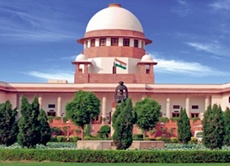Right to privacy can't be a fundamental right, centre tells SC
26 Jul 2017
Right to privacy cannot be elevated to the level of a fundamental right and it cannot be equated with right to life and liberty, the centre has maintained while defending the Aadhar issue before the Supreme Court.
 "Right to privacy was omitted from being mentioned in the Constitution, though it was debated in the Constituent Assembly," Attorney General K K Venugopal submitted before a nine-judge bench presided over by Chief Justice J S Khehar.
"Right to privacy was omitted from being mentioned in the Constitution, though it was debated in the Constituent Assembly," Attorney General K K Venugopal submitted before a nine-judge bench presided over by Chief Justice J S Khehar.
Even the right to life and liberty guaranteed as a fundamental right is not absolute and can be taken away by the state under the procedure established by law like in case of death penalty and incarceration for life, he said.
Arguing before the nine-judge bench, also comprising Justices J Chelameswar, S A Bobde, R K Agrawal, Rohinton Fali Nariman, Abhay Manohar Sapre, D Y Chandrachud, Sanjay Kishan Kaul and S Abdul Nazeer, Venugopal also said the procedure has to be "just, fair and reasonable" as enjoined under the Maneka Gandhi case.
He was replying to the petition filed by a group of Aadhar challengers supported by five states, including Karnataka, West Bengal, Punjab, Himachal Pradesh and Puducherry, seeking the apex court's intervention in the matter.
The petitioners had sought a declaration from the top court that the right to privacy is a fundamental right.
Venugopal, however, submitted nobody can object if the Supreme Court decided to expand the scope of Article 21 to include right to privacy but said it was his duty to place relevant materials, which did not support such a demand.
He submitted that it can't be anybody's plea that right to privacy prevented one from giving his or her biometrics, address, telephone number, identity details etc to the state and elevate right to privacy as a fundamental right.
Aadhaar, Venugopal told the court, has come as a great tool to prevent diversion of funds, meant for the welfare of poor people in a country where 270 million people are below the poverty line.
He also cited a recent World Bank report which stated that Aadhaar is something which every developing country should adopt.
In his arguments before the Constitution bench, Kapil Sibal a senior lawyer representing the four states said in the light of technological advancement, the court needs to take a fresh look on the right to privacy.
Kapil Sibal arguing before the nine-judge bench said that ''Privacy cannot be an absolute right. But it is a Fundamental Right. This court needs to strike a balance.'' Kapil Sibal added.
The apex court had on July 18 set up the Constitution bench after the matter was referred to a larger bench by a five-judge bench.
The petitioners before the top court had claimed that collection and sharing of biometric information, as required under the Aadhaar scheme, was a breach of the ''fundamental'' right to privacy.
The centre had on 19 July submitted in the apex court that right to privacy cannot be a fundamental right as there are binding decisions of larger benches earlier pronounce that it is only a common law right evolved through judicial pronouncements.
The Supreme Court had even earlier considered the character of privacy rights and had arrived at divergent conclusions. While in some of the judgements it was ruled that the right to privacy is fundamental, others concluded that privacy is not a fundamental right.



















